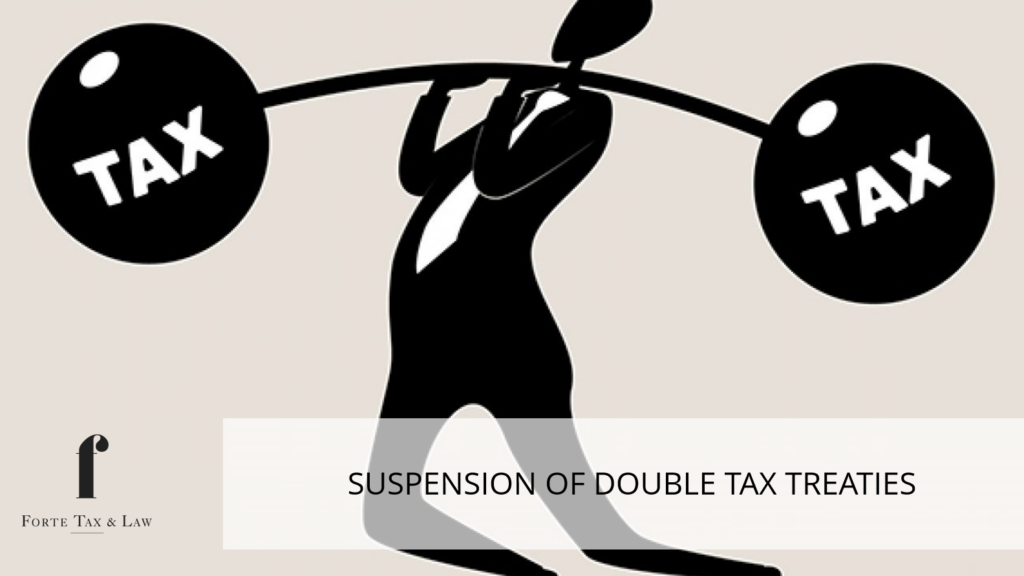Forte Tax & Law » News » Suspension of Double Tax Treaties
Suspension of Double Tax Treaties
On August 8th, 2023, the Russian President issued Decree No. 585, which suspends key provisions of several double tax treaties. Below, you will find comprehensive details about the suspended agreements and their implications.

Decree Overview
The decree halts the application of key provisions in approximately half of Russia’s double tax treaties. The suspension pertains to the following provisions:
- Distributive rules, outlining the taxation of various items of income and allocating taxing rights between states (typically articles 5-21). This includes articles addressing taxation of dividends, interest, royalties, income from permanent establishments, capital gains, employment earnings, and miscellaneous income.
- Provisions related to property taxation.
- Non-discrimination clauses.
- Limitation of benefits provisions stipulated in several treaties, namely: with Sweden, Luxembourg, the United Kingdom, Switzerland, Cyprus, Lithuania, Austria, and Malta.
- Provisions involving mutual assistance in tax collection for agreements with Belgium, Norway, Cyprus, Austria, and Japan.
Remaining unaffected are articles related to the elimination of double taxation, mutual agreement procedures, and the exchange of information.
Impacted Countries
Nearly half of Russia’s double tax treaties have been suspended, namely treaties with Poland, the United States, South Korea, Bulgaria, Sweden, Luxembourg, Romania, the United Kingdom, Hungary, Ireland, Slovakia, Albania, Belgium, Slovenia, Croatia, Canada, Yugoslavia (applying to Serbia and Montenegro), Switzerland, Czech Republic, Denmark, Norway, Italy, Finland, Germany, France, North Macedonia, Cyprus, Spain, Lithuania, Iceland, Austria, Portugal, Greece, New Zealand, Australia, Singapore, Malta, and Japan. Similar actions were undertaken in respect of the treaty with Latvia in 2022.[1]
Suspension Period
The suspension is effective from August 8th, 2023, until “foreign states rectify their violations of the lawful economic and other interests of Russia, the rights of its citizens and legal entities, or until the termination of these international treaties with respect to Russia.”
Legal Framework
Under the Law on International Treaties, the suspension or termination of international treaties is carried out in accordance with the terms of the treaty itself and the norms of international law. It should be executed by the body that accepted the treaty for Russia.[2] In the case of ratified double tax treaties, this body is the Russian Parliament (aka Federal Assembly).
Similar provisions are outlined in the Vienna Convention on the Law of Treaties, which allows for the suspension of a treaty’s effect in accordance with the treaty’s provisions or by agreement among its participants.[3]
The double tax treaties themselves do not provide for the possibility of suspending their effect; they only allow for denunciation provided timely notice is given. According to the Constitution of Russia, if an international treaty establishes rules different from those prescribed by domestic law, the rules of the international treaty apply.[4]
Nevertheless, the Russian law on international treaties has granted the President the right, in situations requiring urgent measures, to suspend the effect of an international treaty which has been ratified by the federal law.[5] The Presidential Decree on the suspension of agreements is based precisely on this provision of the law. However, the decree fails to clearly indicate the specific reasons that necessitated the urgency of suspending the agreements.
The President is obligated to promptly inform the Russian Parliament about the suspension. Additionally, the President must submit to the State Duma (i.e. the lower chamber of the Russian Parliament) a draft federal law on the suspension of the treaties. If the State Duma rejects the draft federal law on the suspension of an international treaty, the effect of such a treaty must be immediately resumed. It appears highly unlikely that the State Duma will reject the bill concerning the suspension of double tax treaties.
Implications
Foreign entities receiving dividends, interest, royalties, or other income subject to withholding tax from Russian entities will no longer be entitled to preferential withholding tax rates or exemptions as stipulated by the respective double tax treaty. Instead, withholding tax will be applied at the rates specified in the Russian Tax Code. Specifically, the tax rate for dividends will be 15%, and for interest, royalties, and other income subject to withholding tax, the applicable rate will be 20%.
We recommend conducting a thorough evaluation of the implications of this decree on your cross-border payments. We would be pleased to offer our assistance in evaluating these consequences and addressing any inquiries related to the suspended agreements.
If you have any questions left or you would like to discuss something, please send an email to Anton Kabakov.
Sincerely,
[1] Decree of the President of September 26, 2022 N 668
[2] Article 37(1) of Federal Law No. 101-FZ of July 15, 1995 “On International Treaties of the Russian Federation”
[3] Article 57
[4] Article 15 (4) of the Constitution of Russia
[5] Article 37 (4) of the Federal Law “On International Treaties of the Russian Federation”
